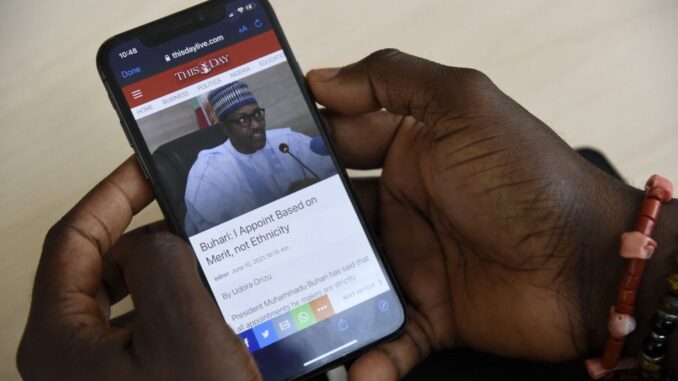
Given the apparent consensus that the controversy being generated from the ban placed on Twitter by the Federal Government is an ill-wind that blows no one any good, the negotiation reportedly ongoing between the two parties is well-directed.
A sustained war with Twitter and other social media platforms can, in the long term, portray Nigeria as a pariah nation, hostile to business and basic freedoms that progressive nations have come to take for granted. And even as government insists on the formal establishment of the platforms in the country, it should be wary of undue prolongation of the feud and its effects on Nigerians.
President Muhammadu Buhari approved a Federal Government’s Team, comprising five ministers chaired by Information Minister, Alhaji Lai Mohammed, to engage with Twitter over the recent suspension of the operations of the microblogging and social networking service in Nigeria. The team includes the Attorney General of the Federation and Minister of Justice, Minister of Communications and Digital Economy, Minister of Foreign Affairs, Minister of Works and Housing, and Minister of State for Labour and Employment as well as other relevant government agencies. Twitter had written to President Buhari seeking to engage with the Federal Government over the suspension, with a view to charting a path forward.
It is important that government considers the wider implications of its decision in suspending the operations of twitter after the micro-blogging platform deleted President Buhari’s tweet considered to have breached its rules of engagement. Before then, Twitter had irked Nigeria by choosing to locate its regional headquarters in Ghana instead of Nigeria where it has a higher number of users. However, the immediate cause of the suspension was the deletion of the president’s tweet, although the government also accused Twitter of yielding its platform to the enemies of the government.
The wide and popular criticisms against the suspension were that it violates basic freedom of speech, the press and various international and local instruments to which Nigeria is a signatory. Some others also pointed to the economic ruin to individuals and corporate organisations whose livelihoods and businesses are tied to Twitter and the multiplier effects on the economy at this time of downturn in almost all economic indications.
The president should be concerned about the historical reference to his tenure as Head of State (1983-1985) and the various anti-press utterances and actions that presented him in negative terms as far as basic freedoms were concerned.
In his first major interview with the local press in 1984, Major General Buhari was asked by Dele Giwa, Ray Ekpu and Yakubu Mohammed what his attitude to the press would be and he replied, “I will surely tamper with press freedom.” The administration followed up by promulgating the draconian Public Officers (Protection Against False Accusation) Decree 4 of 1984, which stipulated a jail term for any journalist who published a report that embarrassed a public officer, irrespective of whether the report was true, or if the report was not true “in every material particular.”
To show its seriousness, two journalists, Tunde Thompson and Nduka Irabor, were tried and jailed and their media organisation fined for publishing, in The Guardian, an exclusive report of ambassadorial postings, which the Buhari’s government said was not true in “every material particular.” According to Newswatch Magazine (September 9, 1985), “Harassment of journalists did not stop there. Almost every month in their first year, one newspaper editor or another was detained for the slightest excuse.”
For a leader that carries such baggage of negative perception, caution ought to be his watchword. According to an African proverb, “a man suspected of stealing a goat should not entertain his guests with fried meat.” Actions against press freedom in recent times can be seen in the almost surreptitious attempt to amend the Nigerian Press Council (NPC) Act, the overbearing activities of the National Broadcasting Commission (NBC) on broadcast media outlets and desperate attempts to regulate the social media by law and other telltale signs of a government increasingly intolerant of the press.
No nation can surrender its sovereignty to private enterprise, but the pervasiveness and complexity of the digital age ought to be given prime consideration. Marshall McLuhan’s prediction about the world being a global village is unfolding even more as a global family where there is no hiding place. Rather than engaging in battle with this unfolding phenomenon, it is better to understand it and evolve beneficial strategies to tame its more malodorous effects.
A suggestion for Nigerians to return to the pre-social media era, as postulated by Hon Fatihu Mohammed of the House of Representatives is laughable and unrealistic. What is needed is a robust engagement with Twitter and other social media platforms to reverse negative perception of the intention of government, and thus safeguard the political and economic interests of Nigerians.
END

Be the first to comment